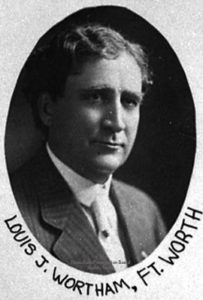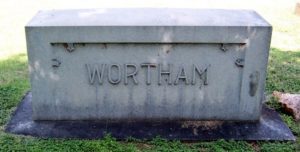
Louis J. Wortham, member of the Texas Legislature (1909-1915) for Tarrant County. Photo from Texas House of Representatives.
While in Santa Fe last month I made a pilgrimage to Dumont’s Maps and Books, one of my very favorite haunts there. Mr. Dumont’s shop is not in the ritzy part of town with fine furnishings. It’s near the railroad, rather dusty, and one sits on the floor to scan through books. But he has good prices and works seldom found elsewhere. Hence, I returned home with all five volumes of Louis J. Wortham’s History of Texas: from wilderness to commonwealth.
Wortham created a valuable overview of Texas history from the Spanish era through 1920. For an understanding of the chronology of Texas, Wortham can hardly be beat. However, like most literary and historical works, it is fraught with errors. Read it for the general story of Texas, but find another book when you want exact details.
In his introduction he states that he wanted to write a Texas history that was published in Texas, a goal he accomplished. Granted there were publishing houses in the state in 1924 when the collection came out, I was intrigued that a historian should be so concerned where the work was published. That’s where I began to look into Mr. Wortham’s past.
He was not a trained historian, but a legislator and journalist born in 1858 over in Hopkins County. His father was the editor of the Sulphur Springs Gazette. Louis followed his father’s footsteps, working for various Texas journals and for a while edited Current Issue, a weekly journal of comment in Austin.
In 1906 Wortham became involved in the Fort Worth Star. By 1909 the Star merged with another Fort Worth newspaper to become the Fort Worth Star-Telegram. Louis J. Wortham was publisher and president with Amon G. Carter advertising manager.
At the same time, Wortham represented Tarrant County in the Texas Legislature from 1909 to 1915. That year Wortham was appointed Regent of the University of Texas, even though he was not alum. In 1924 Wortham completed his masterpiece that was published by Wortham-Molyneaux Company in Fort Worth.
Now the mystery of Louis J. Wortham. Although he was born and reared in Hopkins County, he spent most of his public career in Austin and Fort Worth. Yet, his death certificate of September 10, 1927 declared he died at his home at 2718 Wesley Street in Greenville, Texas. Why Greenville and not Fort Worth? He had resided in Greenville for one year and he died from kidney trouble. The death certificate contained the clue.
Wortham’s first wife was Faye Becton Wortham (1858-1922) and his attending physician was Dr. Joe Becton. My conclusion is that Louis Wortham developed kidney problems, trusted Dr. Becton who was his wife’s relative, bought a house in Greenville, and moved here for the remainder of his life.
That’s what makes history so interesting, those little clues.


Interesting historical tid bit. I`m guessing the grand hotel in downtown Ft Worth was named for him? In my youth in Greenville there was a row of apartments at the Wesley St dress named Christine Courts. The building was one story and had maybe 4 or 6 apartments. I thought it was attractive in a time when attractive apt complexes in Greenville were rare. Wonder ef the name Christine had a connection to the Bectons or to Mr Wortham?